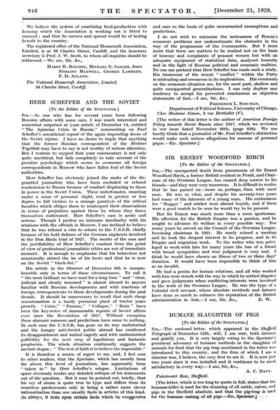HERR SCHEFFER AND THE SOVIET [To the Editor of the
SPECrATOR.1
Sts,—As one who has for several years been following Russian affairs with some care, I was much interested and somewhat surprised at your article of December 14, entitled " The Agrarian Crisis in Russia," commenting on Paul Scheffer's sensational expose of the again impending doom of the Soviet regime. I have no desire to imply that anything that the former Russian correspondent of the Berliner Tageblatt may have to say is not worthy of serious attention. But I venture to suggest that your commentary is not only quite uncritical, but fails completely to take account of the peculiar psychology which seems to overcome all foreign correspondents in Moscow who have fallen foul of the Soviet authorities.
Herr Scheffer has obviously joined the ranks of the dis- gruntled journalists who have been excluded or refused readmission to Russia because of conduct displeasing to those in power in the Soviet -Union. These unfortunates, smarting under a sense of personal slight, tend in greater or less degree to fall victims to a strange paralysis of the critical faculties which obliges them to reinterpret their observations in terms of prejudices against those by whom they fancy themselves maltreated: Herr Scheffer's case is acute and serious. Though I profess no intimate familiarity with his relations with the officials in Moscow, I am inclined to believe that he was refused a visa to return to the U.S.S.R. chiefly because of his bold defence of the German engineers involved in the Don Basin trial of 1927. The merits of the case and the justifiability of Herr Scheffer's conduct from the point of view of professional journalistic ethics are not of immediate moment. It is enough to emphasize that his behaviour not unnaturally stirred the ire of his hosts and that he is now on the Soviet " black-list."
His article in the Observer of December 8th is compre- hensible only in terms of these circumstances. To call it "the most brilliant we have read for a long time " and " clear, judicial and -closely reasoned " is almost absurd to anyone familiar with Russian developments and with reactions of foreign correspondents to these developments during the past decade. It should be unnecessary to recall that such cheap sensationalism is a hardy perennial plant of twelve years growth. " Crisis," " Famine," " Collapse," " Ruin " have been the key-notes of innumerable reports of Soviet affairs ever since the Revolution of 1917. Without exception these alarmist rumours and predictions have come to nothing. In each case the U.S.S.R. has gone on its way undisturbed and the hungry anti-Soviet public abroad has swallowed its. disappointment and waited eagerly and with undiminished gullibility for the next crop of lugubrious and fantastic prophecies. The whole situation continually suggests the ancient slogan : " The test of faith is to believe the impossible." it is therefore a source of regret to me, and, I feel sure to other readers, that the Spectator, which has usually been far above this level of journalism, has apparently been " taken in " by Herr Scheffer's relapse. Limitations of space obviously render any detailed critique of his statements out of the question. But it may be pointed out, briefly, that his cry• of alarm- is quite true to type and differs from its countless 'predecessors only in being a rather more clever rationalization than one usually finds in articles of this kind.
As always, it rests upon certain (acts exaggerate*
and uses as the basis of quite unwarranted assumptions and predictions.
I do not wish to minimize the seriousness of Russia's economic problems nor underestimate the obstacles in the way of the programme of the Communists. But I must insist that these are matters to be studied not on the basis of hearsay and complaints of peasant women but with an adequate equipment of statistical data, analysed honestly and in the light of Russian political and economic realities. No one can pretend that Herr Scheffer has made such a study. His treatment of the recent " conflict " within the Party is misleading and erroneous in its implications. His comments on the economic situation are, for the most part, shallow and quite unsupported generalizations. I can only deplore any tendency to accept his perverted conclusions as objective statements of fact —I am, Sir, &c., •
FREDERICK L. SCHUMAN,
Department of Political Science, University of Chicago. Chez Madame Simon, 8 rue Berthollet (V).
[The writer of this letter is the author of American Foreign Policy towards Soviet Russia since 1917, which we reviewed in • our issue dated November 30th, (page 828). We can hardly think that a journalist of Mr. Paul Scheffer's distinction would make such serious allegations for .reasons of personal pique.— En. Spectator.]


































 Previous page
Previous page